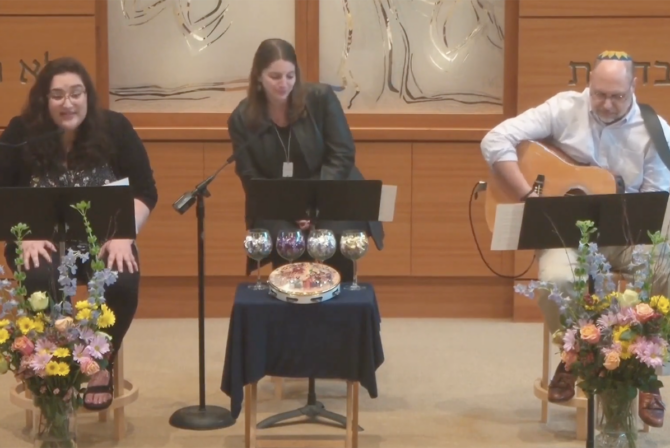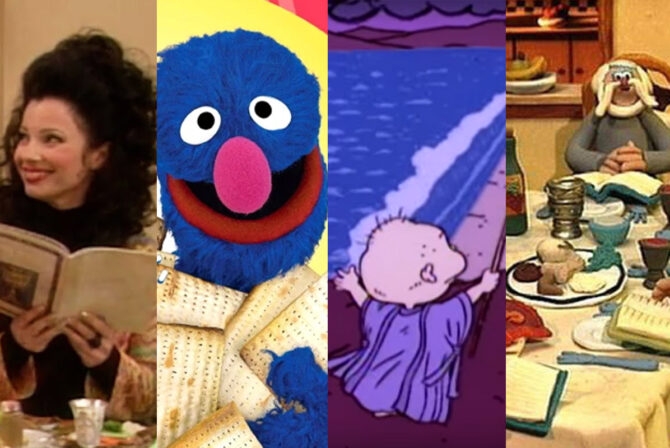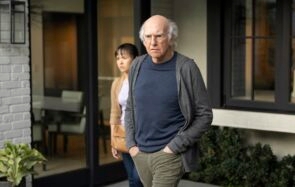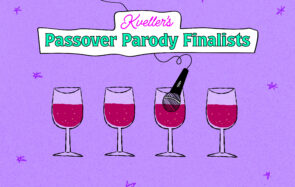Having a mother with a Master’s in Media Analysis means that not only are my poor kids (ages 14, 10, and 6) subjected to a semiotic postmortem following every movie we watch (What message is “Shrek” sending about intermarriage? Are “The Incredibles” elitists?) but also that I’m very particular about the television they watch. (I work in TV, I think it’s a fantastic, miraculous medium. But, I am also wary of the messages it sends, both deliberate and inadvertent.
I try to find shows for the whole family to watch together that are primarily entertaining. And feature characters the kids can relate to. And espouse values I believe in. (For instance, while I would love them to watch more shows starring African-American families, “The Jeffersons” and “Good Times” are off the table. I don’t like the subtext. Even if I’m the only one who sees it. “Fresh Prince of Bel-Air” and “The Cosby Show” are better.)
When it comes to primetime programming that features Jewish characters in prominent–acceptable (to me)–roles, I have even less to choose from (oh, how I still miss “Brooklyn Bridge”). That’s why I was intrigued by ABC’s new half-hour sitcom, “The Goldbergs,” which premiered last night. Think of it as “The Wonder Years” set in the 80s. With Paul’s family front and center, rather than Kevin’s.
Full disclosure: I am merely assuming that the family is Jewish, based on the last name and the fact that it was created by a writer named Adam Goldberg who, growing up in the 1980s, always had a video-camera in his hand (just like his TV alter ego) and is, in fact, Jewish.
There was, however, no concrete confirmation of it in the first episode. Yes, there are Jewish actors in the cast, most notably George Segal. But there is also an actor named Troy Gentile, which perhaps is amusing only to me, under the circumstances.
Instead, what we got was a family of no particular ethnic origin that yells a lot, especially the dad, an overbearing mom who smothers her children and reportedly has no other interests in life, an older sister who is implied to be easy, a nebbishy older brother who can’t quite seem to do anything right, Grandpa, who buys flashy cars and fancies himself quite the ladies’ man, and the baby of the family, who aspires to go into show-business (hence, the ever present video camera).
Is that really the image I want my kids to have of the only (presumably; nominally) Jewish family on TV?
To be fair, at the end of its debut half-hour, my husband did offer, “Wow, that wasn’t nearly as bad as the commercials suggested it was going to be.”
I agree. While the promos emphasized the belittling and yelling, the guilt trips and the obligatory dysfunction, the actual show also displayed periodic moments of heart, not just between the parents, but also between the kids and their grandfather (along with boob jokes).
I’m willing to give the show another try next week. But, I’m not quite ready to expose my kids to it, yet. Not until I get a firmer handle on where it’s headed. (And check the ratings. No sense getting attached if it’s destined to be a six-episodes-and-out failure. I want my kids to know life isn’t fair, but I’ll spare them the true heartbreak of TV cancellation.)
Instead, if I want to show my children a sitcom about Jewish family life, I’ll show them the other Goldbergs. The black-and-white television show that ran from 1949 to 1956 (after 17 successful years on the radio). The one that featured an unabashedly Jewish family, complete with an uncle who spoke with a Yiddish accent and a mother who had plenty of outside friends and interests, didn’t yell (unless she had to), who was respected by her husband and children, and whose accentless English nevertheless carried the syntax, phrasing–and wisdom–of the old country.
We tend to think of the 1950s in America as repressive and white bread, populated by traditional, “Leave It to Beaver” and “Father Knows Best” families; conservative and unaccepting of any deviation from the norm. We pride ourselves on being much more open-minded now, on acknowledging that there are many different kinds of families and cultures and lifestyles.
And yet, over 50 years after the original “Goldbergs” went off the air, I can’t imagine any network–not even the self-proclaimed “edgy” ones like HBO or Showtime–airing a sitcom where the whole family can be openly, unapologetically Jewish, without it becoming their singular, defining trait and/or the subject of “A Very Special Episode.” One where speaking with an accent isn’t there to make a political point, or to be the butt of a joke, or to invite criticisms of stereotyping, but simply the way an immigrant of a certain age, from a certain place, would speak. A show where the family can be both Jewish and “normal.”
In other words, when I want my kids to see a truly progressive version of an American-Jewish family, I’ll show them the one that first hit the airwaves in 1929.
(If you’d like to check it out for yourselves, select episodes are available on Hulu.)
Like this post? Get the best of Kveller delivered straight to your inbox.








